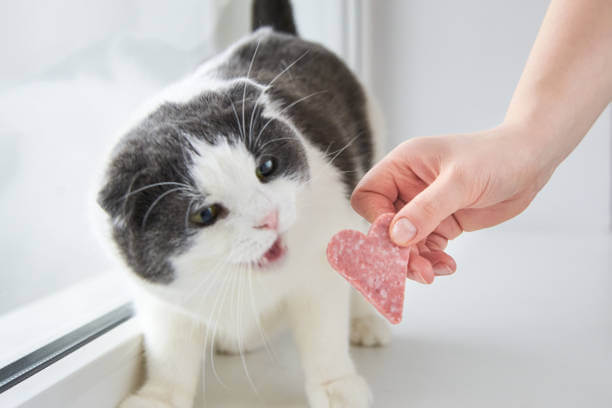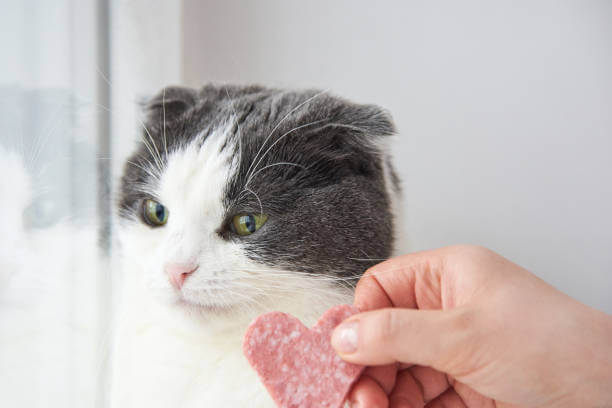We all are curious but can Cats Eat Pepperoni? Learn about the potential health concerns of feeding your cat pepperoni as well as other tips to keep them safe and healthy. Pepperoni, with its tantalizing aroma and spicy flavor, is a popular pizza topping enjoyed by many. As a cat owner, you may find yourself wondering whether it’s safe to share this delicious treat with your feline friend. After all, the temptation to give in to those cute begging eyes can be hard to resist. However, when it comes to our pets’ health, it’s essential to make informed decisions. In this article, we will explore whether cats can eat pepperoni and discuss the potential health concerns associated with it.

Understanding Cats Eat Pepperoni
Before delving into the safety of feeding pepperoni to cats, let’s take a moment to understand their dietary needs. Cats are obligate carnivores, which means they require a diet primarily composed of meat. Their bodies have evolved over thousands of years to thrive on animal protein rather than plant-based foods. Therefore, it’s crucial for their overall health and wellbeing that they consume a nutritionally balanced diet that meets their specific needs.
The Risks of Feeding Pepperoni to Cats
While pepperoni itself isn’t toxic or immediately life-threatening to cats, there are several reasons why it’s best to avoid feeding them this spicy cured meat:
High Fat Content
Pepperoni is high in fat, which can be detrimental to your cat’s health. Excessive intake of fatty foods can lead to weight gain and obesity in felines. Obesity increases the risk of various health issues such as diabetes, heart disease, joint problems, and liver disease.
Spices and Seasonings
Most varieties of pepperoni contain spices like garlic and onion powder as well as other seasonings. These ingredients are known to be toxic to cats and can cause gastrointestinal upset or even damage their red blood cells if ingested in large amounts.
Sodium Content
Pepperoni is also notoriously high in sodium, which can be harmful to cats. A diet high in sodium can lead to dehydration and put strain on their kidneys, potentially leading to kidney disease or exacerbating existing conditions.
Potential Health Concerns for Cats
Feeding pepperoni to your cat, even in small amounts, can have various health implications:
Digestive Upset
Cats have sensitive digestive systems, and introducing new or unfamiliar foods can easily upset their stomachs. Consuming pepperoni may cause diarrhea, vomiting, or other gastrointestinal discomfort.
Pancreatitis
The high fat content of pepperoni puts cats at risk of developing pancreatitis—an inflammation of the pancreas. This condition is painful and potentially life-threatening if left untreated.
Allergic Reactions
Some cats may have allergies or sensitivities to certain ingredients found in pepperoni, such as spices or preservatives.
Safer Alternatives for Treating Your Cat
While it’s best to avoid feeding your cat pepperoni altogether, there are safer alternatives you can offer as occasional treats:
Lean Cooked Meat
If you’re looking to treat your cat with some meaty goodness, opt for lean cooked meats like boiled chicken or turkey. Remove any skin, bones, and seasoning before offering it to your feline companion.
Commercial Cat Treats
There is a wide variety of commercially available cat treats specifically formulated to meet feline nutritional needs. These treats are often low in fat and free from harmful ingredients commonly found in human foods.
Interesting Facts About Pepperoni
Pepperoni is a type of salami that originated in the United States in the early 1900s. It’s made from cured beef and pork, seasoned with spices such as garlic, black pepper, paprika, and fennel seeds. This spicy sausage is now popular around the world and widely used as a pizza topping.

What Does Pepperoni Contain?
Most varieties of pepperoni contain beef, pork, and a blend of spices such as paprika, garlic powder, onion powder, and fennel seed. Some commercially available brands may also include additional additives such as preservatives or sodium nitrate.
It’s important to note that even a balanced diet of healthy cat food and treats should not make up more than 10-15% of your cat’s daily caloric intake. The remaining calories should come from freshwater and wet foods specifically designed for cats. Lastly, it’s always wise to consult with your veterinarian before introducing any new foods into your cat’s diet.
Final Thoughts
Although a tiny slice of pepperoni may seem harmless, it’s best to resist the temptation and keep this human food off-limits for cats. Pepperoni is high in fat, spices, and sodium—all of which can be detrimental to your pet’s health. If you want to treat your cat to something special, opt for lean cooked meats or commercially available cat treats formulated especially for felines. Lastly, remember to always speak with your vet before introducing any new foods into your cat’s diet. With these tips in mind, you can rest assured that your feline friend is staying safe and happy!
FAQS
Q: Is pepperoni safe for cats?
A: No, it is best to avoid feeding your cat pepperoni as it can be detrimental to their health. Pepperoni is high in fat, spices, and sodium—all of which can be harmful if consumed in large amounts. If you want to treat your cat, opt for lean cooked meats or commercially available cat treats specifically designed for felines.
Q: What is a healthier alternative to pepperoni for cats?
A: Lean cooked meats like boiled chicken or turkey are a much healthier option compared to pepperoni. Make sure you remove any skin, bones, and seasoning before offering it to your feline friend. You can also treat your cat with commercially available cat treats specifically formulated to meet their nutritional needs. These treats are often low in fat and free from harmful ingredients commonly found in human foods.
Q: Is it okay to give my cat a small piece of pepperoni as a treat?
A: No, even small amounts of pepperoni can be detrimental to your cat’s health. It’s best to avoid feeding your cat pepperoni altogether. If you want to give them a special treat, opt for lean cooked meats or commercially available cat treats specifically designed for felines. Lastly, remember to always speak with your vet before introducing any new foods into your cat’s diet.
Q: What health issues can arise from consuming pepperoni?
A: Consuming pepper can lead to digestive upset, pancreatitis, and allergic reactions. It can also put cats at risnks of various health issues such as diabetes, heart disease, joint problems, and liver diseases due to its high fat content and sodium levels. For these reasons, it is best to avoid feeding your cat pepperoni altogether.
Conclusion
Feeding your cat pepperoni is generally not advised due to its high fat content, spices, and sodium levels. It can lead to serious health problems such as pancreatitis, digestive upset, and allergic reactions. If you want to treat your cat to something special, opt for lean cooked meats or commercially available cat treats specifically formulated for felines. Lastly, always speak with your vet before introducing any new foods into your cat’s diet. With these tips in mind, you can rest assured that your feline friend is staying safe and happy!
